Several women could not arrange to be photographed; they include Lisa Fisher, Barbara Ronchetti, Rebecca Gilbert, and Mallory Watts. Debbie Farber of Blackwater Farm is a crucial member of the farming community, but was unavailable for an interview.
Lisa Fisher, Stannard Farm, West Tisbury
What type of farmer are you?
Certified organic vegetables, pigs, layers, and meat birds.
Did you grow up on a farm? Go to school for it?
My grandparents had a farm. No schooling for it.
So, how’d you end up running a farm?
Started growing vegetables, and expanded to grow more for the catering company I worked for … Decided I liked growing things outside, rather than cooking them inside.
How long have you been farming on this farm?
Since 1977.
What’s the best day/week/season you’ve had?
Hard one … any day is great when stuff gets done, and my workers can get me through it!
What disaster or failure did you learn from?
When the drive chains come off their cogs on the potato digger, and I have help waiting on orders … Tommy fixed it, and we only had to dig half a row by hand.
What’s the biggest lesson?
Keep records, so you don’t make the same mistakes again.
If you could ask for one thing to change about farming on M.V., what would it be?
I would like the farmers on the Vineyard to be more honest about being organic. It is illegal for them to use the word organic if they are not certified. I worked hard to be certified, and resent their “free ride.”
What’s the best thing you make in your own kitchen from something produced on your farm?
Catsup!
Julie Scott, Slough Farm, Edgartown
What type of farmer are you?
My husband and I collectively run a mixed operation — I manage the livestock, food distribution and agricultural programming, and he manages the garden and field (tractor) work.
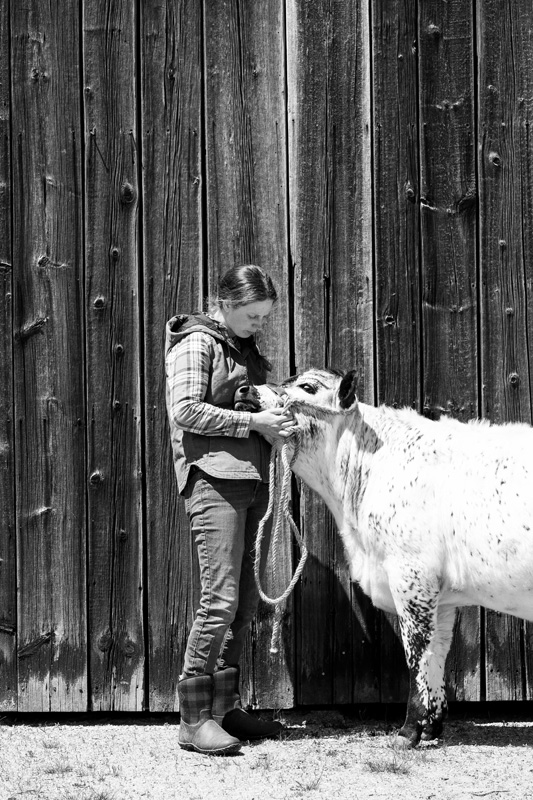
So, how’d you end up running a farm?
I owe it all to Sam Feldman. We moved to the Island 12 years ago to work as farm hands at the FARM Institute, which Sam Feldman is a founder of. About a year later, I became the farm manager, and stayed for another six years. After I left, I did a two-year stint at Animal Healthcare while managing the Land Bank’s herd of 200 goats. I got a call one day from a woman in New York who wanted to buy a farm on the Island. She had met Sam Feldman at an event on-Island, and he said I was the person to talk to. Now, four and a half years later, we are living on and running that farm. Thanks, Sam!
How long have you been farming this farm?
We came on as consultants in fall of 2015. My husband started in spring of 2016 managing the garden, and I came on full-time to manage the farm, four months pregnant, in spring of 2017.
What’s the biggest/hardest lesson you’ve learned?
Be humble. Ask for help, talk to each other, work together!
If you could ask for one thing to change about farming on M.V., what would it be?
I think there are a lot of possibilities for wool and hides here on the Island. We have such a rich history of sheep! I would love to collectively, as shepherds, figure out a way to make it more affordable and convenient for us to process our wool into yarn, so that those who don’t want to deal with it aren’t just throwing it away. Getting your sheepskins back from the processor is a pain, as is storing them and tanning. I would love to see small-scale wool processing and hide tanning equipment here on the Island!
Private farm; Instagram: @slough_farm_mv
Rebecca Miller and daughter Ruby Dix, North Tabor Farm, Chilmark
(answers by Rebecca Miller)
So, how’d you end up running a farm?
I learned how to grow flowers and salad greens from Prudy Burt about 28 years ago. We were business partners (gardening and small-scale growers), and called ourselves Local Color. I outgrew my third-of-an-acre yard in Vineyard Haven, and Matthew [Dix, husband] and I heard about a small farm for sale in Chilmark. It was a perfect fit for us, as we needed more growing space, and it was being sold as affordable housing with farming restrictions. I had no clue how to farm, but knew a little about gardening, so we hired farm workers who were more skilled than us to help teach us how to grow on a larger scale. We took it slow, and each year added to our field crops. Each year we increased our employees and learned more about farming, teaching, and forming healthy relationships with land and each other.
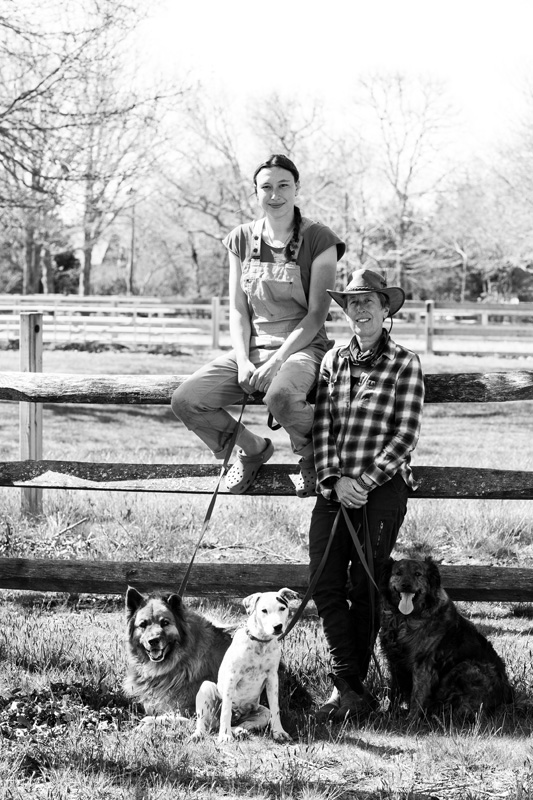
What disaster or failure did you learn from?
Aside from employees mistakenly mowing down lucrative crops, soggy-bottom salad greens, a stolen bridal bouquet, and the horses escaping down North Road … No, can’t really say there were any disasters.
What’s the biggest/hardest lesson you’ve learned?
My biggest regret was not going to the beach enough with my children when they were young because I was too busy on the farm. I have always said that the farm was my fourth child that never grew up. Having a farm requires constant attention, with little sense of completion, and it limits your freedom. When we had 10 dairy goats, there were very few off-Island adventures. Learning how to balance farm life with relaxation and pleasure was a long process.
What would you consider the biggest issue you, and other Island farmers, will face in the coming years?
The challenge of finding young people who want to work really hard for little financial gain in order to be connected to their food. While farming is valued, it is extremely hard to make a living. Another challenge is to revise the way we farm into more regenerative practices, ensuring there is a future in soil farming.
What makes farming here different — isolation? Climate? Culture?
Farmers are rock stars here. We value farming, and appreciate the beautiful results of it. We are willing to pay the extra for it because people understand the work involved (thanks to IGI for educating us!). I have a self-serve, honor-based farm stand, and I feel proud to be part of a community that supports it.
If you could ask for one thing to change about farming on MV, what would it be?
Think regenerative instead of sustainable.
What’s the best thing you make in your own kitchen from something produced on your farm?
Arugula blueberry salad with pickled hakurei turnips. I can’t wait!
4 North Road, Chilmark, farm stand, and West Tisbury Farmers Market
northtaborfarm.com; @northtaborfarm
Jo Douglas, Fork to Pork, Vineyard Haven
What type of farmer are you?
I am a livestock farmer who raises 30 pigs each year.
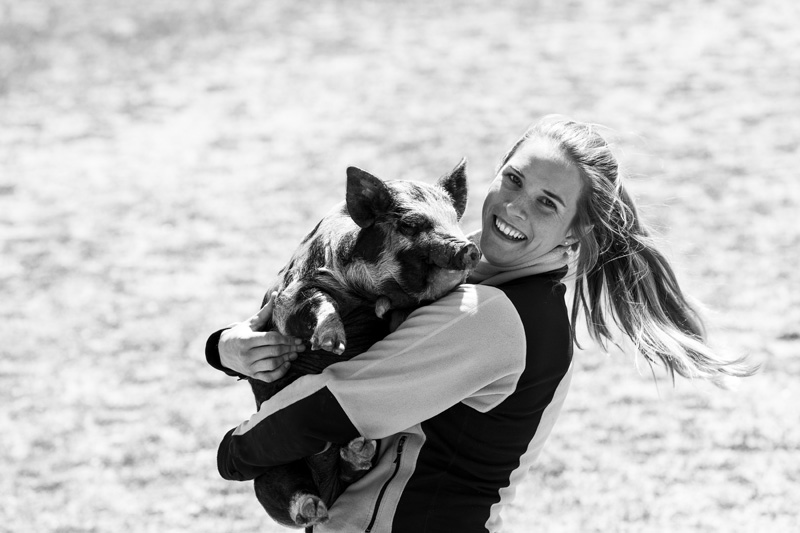
Did you grow up on a farm? Go to school for it?
I did not grow up on a farm, but in a pretty urban suburb of Boston. I went to school for agriculture; I majored in sustainable agriculture and food production, with a minor in animal studies at Green Mountain College in Vermont. My first true farm experience was attending a farm camp in sixth grade in central Massachusetts, and three summers later, I decided I wanted to be a farmer. I worked on various pasture-based livestock and diversified farms through high school and college, and full-time in the years after I graduated from Green Mountain College.
How long have you been here on this farm? Farming overall?
This is my second year running Fork to Pork here on-Island, but I have been farming for six years since graduating from college.
If you could ask for one thing to change about farming on M.V., what would it be?
I’d love to get a USDA-inspected slaughterhouse here …
What’s the best thing you make in your own kitchen from something produced on your farm?
I’m one for the simple ground pork meatballs — my pork already has so much flavor, so nothing really needs to be added. You are what you eat, and my pigs enjoy a diverse diet of lots of vegetables and fruits, as opposed to the standard corn/grain/soy hog feed almost all pigs eat, so I allow for the full flavor of the meat to speak for itself.
80 Stony Hill Road, Vineyard Haven
call or text 508-687-4649; forktopork.com; @forktopork
Molly Glasgow, the Grey Barn, Chilmark
So, how’d you end up running a farm?
As a child I would sit in a field across from the apartment complex where we lived in Sealy, Texas. It had tall grasses, wildflowers, and bluebonnets. I would sit there and imagine that when I grew up I would have an ENTIRE acre. In my mind, that was what a really, really large farm was — an acre. My plan was that every Sunday I would go to the local SPCA and adopt all of the cats and dogs that no one wanted. The cats would live on one side and the dogs on the other.
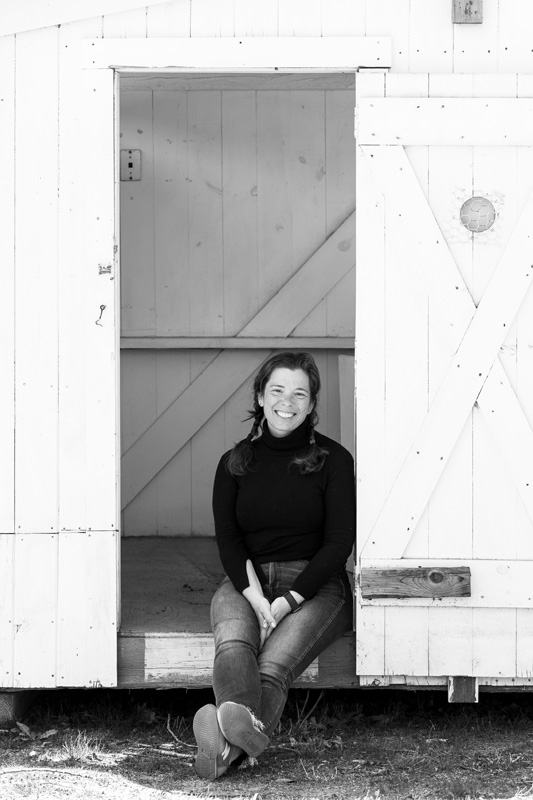
Years later when our farm, formally known as Rainbow Farm, came available, it was the right time in our life to make a change. I had wanted to have a family cow for years, ever since I started making yogurt at home when my oldest was just a baby in a high chair. Eleven years later, and I think we have a bit more than just a family cow.
What disaster or failure did you learn from?
In 2012 I had been making cheese and bottling milk on our farm for a couple of years, and I was sick all of the time. Finally, after many trials and errors, tests, and results, we were told that I have ulcerative colitis. This isn’t the worst part, although at times it can be pretty horrid. I was also told I have a dairy allergy. Not a sensitivity — an allergy to a protein present in all mammalian milk. So running a small New England family farm whose backbone is dairy — and I can’t enjoy our amazing organic cheeses or our beautiful raw milk, I’d say is a real disaster.
Did you grow up on a farm? Go to school for it?
I grew up in stockyard territory. Sealy is about an hour due west of Houston. It was and still is a small town of about 3,000 people. For dinner we would go to the stockyard Mexican food restaurant. The windows looked out over the cows. At the time I didn’t think anything of it except that I got to be up close to the animals. These large creatures rambling around and looking in the windows. I loved it. My uncle was a rancher and my aunt an awardwinning barrel racer. I thought the world of them.
What’s the best thing you make in your own kitchen from something produced on your farm?
French toast with bacon. I take our challah or brioche, our milk, our eggs, and I grab some of our bacon out of the farm stand. From there I make a dairy-free version for myself (our challah is parve, meaning it is made without milk products), and I slice up big pieces for my family. I top the griddled French toast with cherry jam that I make in the summer from fruit I harvest in our orchard. And the bacon: Have to fry up some bacon! Delicious!
22 South Road, Chilmark
thegreybarnandfarm.com; 508-645-4854; @thegreybarnchilmark
Farm stand, West Tisbury Farmers Market, and cheeses sold around M.V. and the country
Debbie Athearn, Morning Glory Farm, Edgartown
What type of farmer are you?
We are mainly a vegetable/fruit/flower farm, but also raise chickens for both eggs and meat, pork, and beef. We sell most of what we produce through our farm stand.
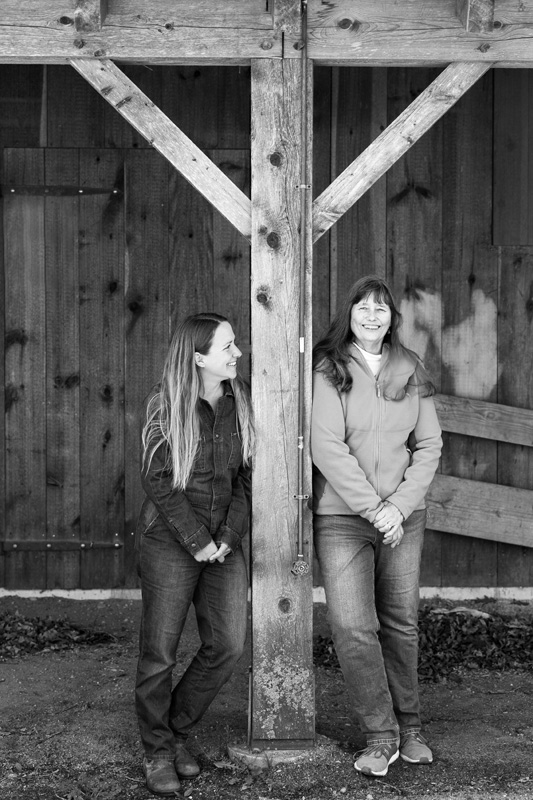
Did you grow up on a farm, or go to school for it?
I did not grow up on a farm or go to school for agriculture. I grew up in Edgartown, and was in 4-H at the Sweetened Water Farm. I had horses from the age of 12 through high school. I went to college for elementary education, but only taught for a couple of years. We moved back to the Vineyard in 1973, and shortly after that started clearing the land on this piece of ground that my father left me. In 1975 we started selling at our house, and shortly after that started attending the W.T. Farmers Market.
How long have you farmed?
This is our 45th year.
What disaster or failure did you learn from?
We had very many terrible years with crop failures and losses, but the worst was 1991, with Hurricane Bob. That wiped out all our crops, and ended our business in mid-August. We had harvested lots before the storm, and put it in our cooler, but since power was out for nearly a week, we lost all that. I remember thinking that crops underground would be fine, but that was not the case, as the salt from wind-driven spray destroyed them. I remember eating a few crops and finding they tasted of salt.
What is the hardest/biggest lesson learned?
Farming is a 24/7 way of life that can devour all your thoughts and make it hard to stay above what you see as the next disaster looming. Money was always a stressful situation, and we learned to stay positive and never give up. We were lucky to have such wonderful, loyal customers and employees over the years, who kept us going.
We learned early on to divvy up jobs and areas. I took on being in charge of the greenhouses, flower fields, farm stand, and bookkeeping. We learned it was too hard on the employees to have two bosses!
We are incredibly lucky to have our three wonderful children and their spouses involved, and committed to the farm and taking over when we step back.
West Tisbury-Edgartown Road, Edgartown
morninggloryfarm.com, 508-627-9003, @morninggloryfarmmv
Farm stand, West Tisbury Farmers Market
Robyn Rose Athearn, Morning Glory Farm, Edgartown
How long have you been farming? Did you go to school for it?
I’ve been farming for about 20 years, flower farming for the last 10. I have my master’s in education, and I completed the University of California’s sustainable agriculture apprenticeship program in 2006.
What makes farming here different?
I grew up in rural Pennsylvania, where many farmers end up packing their produce in waxed boxes and shipping it hundreds, sometimes even thousands of miles away. One of the greatest joys of farming on the Vineyard is the highly supportive and enthusiastic community that embraces the bounty of the Island farms with open arms. It truly is the sweetest blessing. We find support not only from individuals but grocers, florists, business owners, and restaurateurs. The level of community participation in the local food system on Martha’s Vineyard is extraordinary.
What’s the biggest, hardest lesson learned?
A big lesson I’ve learned from my relationship with the earth is that it is a dynamic play, always changing, new successes and challenges with every season, surprises around every corner. With time I have learned that good plans are important, but being able to yield to reality is key to maintaining a healthy farming life. Some years are great cucumber years — make a lot of pickles, enjoy it. Everything came together in the universe to give you the perfect cucumbers; try not to wish for tomatoes.
West Tisbury-Edgartown Road, Edgartown
508-627-9003, morninggloryfarm.com, flowers@morninggloryfarm.com
Farm stand, West Tisbury Farmers Market
Emily Fischer, Flatpoint Farm, West Tisbury
So, how’d you end up running a farm?
I don’t run the farm; my dad and my aunt are nice enough to let me help out.
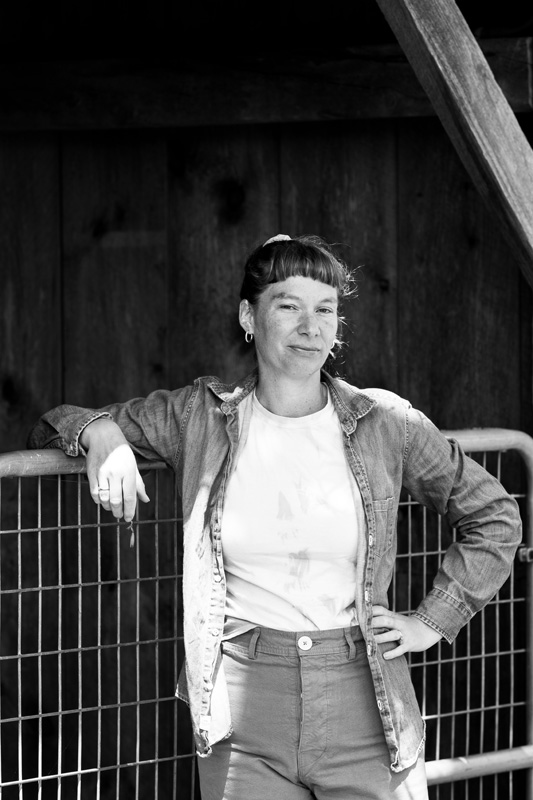
Did you grow up on a farm? Go to school for it?
I grew up on the farm, and never really saw myself coming back here until after I graduated college with a degree in English literature. I was into horses as a kid, so I have always been drawn to animals. I definitely prefer animal farming to vegetable farming.
How long have you been farming on this farm?
We have been selling soap at the W.T. Farmers Market for 11 years this year, which I would say is how long I have been farming.
What is different about the way Island farmers farm, versus those off-Island?
I think we have an incredible summer population who really value small farms and what they represent, as well as having the money to buy the products that we farmers make. I recognize that I am not making a product for the masses, I am making a luxury item. It is also an item that keeps my family farm alive and thriving.
What’s the best thing you make in your own kitchen from something produced on your farm?
I love my foaming soap for the kitchen and the bathroom. It is great for kids, and good if you have dry skin.
Great Neck Road, West Tisbury
West Tisbury Farmers Market
flatpointfarm.com, @flatpointfarm
Caitlin Krol, Kuloko Farm, Vineyard Haven
What type of farmer are you?
I have been growing fruits and vegetables in Massachusetts, pesticide-free, for 14 years.
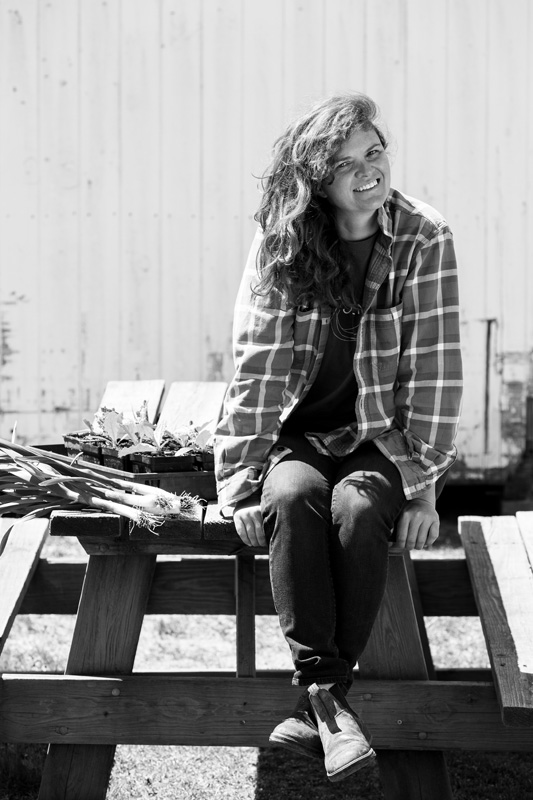
What’s the best day/week/season you’ve had?
The first week in August, 2017. I was the evening milker at Mermaid Farm, and everything revolved around 4:30 pm. Anyone who knows me will tell you how much I love the cows. That spring, I had built my first greenhouse with Jim Creedon, behind the milking parlor, and when I wasn’t milking the cows or helping Jess Miller with yogurt, I was fully immersed in my own world of seeds, soil, and vegetables. That summer, my tomatoes were just right, and Bill Murray scooped up all the tomatoes at the farm stand. I won my first pin in the fishing derby that fall, and the rest is history.
What’s the biggest/hardest lesson you’ve learned?
Be flexible and able to adapt. Find solutions. Do not give up.
If you could ask for one thing to change about farming on M.V,, what would it be?
Affordable year-round housing.
What’s the best thing you make in your own kitchen from something produced on your farm?
Fresh herb salads, especially parsley! Chop up a mound of fresh parsley leaves and stems, add whatever you’ve got fresh from the garden, make a quick pickle with onions and/or radishes, whisk up a vinaigrette, add crumbled feta, and nuts or seeds if you’d like, gently toss, fresh cracked pepper and devour with the ones you love!
Farm stand, Newton Road and Lagoon Road, Oak Bluffs
@kulokofarm
Rebecca Gilbert, Native Earth Teaching Farm, Chilmark
What type of farmer are you?
I am an everything farmer. In fact, my life overflows — farming into foraging, nature worship, education, and art. I don’t necessarily distinguish which parts are which in practice, although in theory I would define the “farming” part as the attempt to produce and provide food or services for sale, as opposed to for our own use. Some of the animals we raise are not used for food, but if they pay their way, they are farm animals, not pets. A farm animal in most cases does not get veterinary care beyond its replacement cost (with a few exceptions, such as when contagion is suspected), whereas with pets the sky is the limit. In the plant world, the seedlings I grow for sale are farming, but the flowers I grow to plant here are not. So, I am a farmer when I do something for money, and the rest of the time, I am just living on (and off) the farm.
The most important thing I have learned from farming is to get out of my imagination and deal with reality. Good intentions and daydreams have their place in the planning process, but they don’t cut the mustard day to day. Like my Buddhist friends who exhort me to “sit with what is,” farming has taught me to “work with what is,” when I like it and equally when I don’t, and that’s been very steadying for me.
The hardest lesson I’ve learned is that I am not as smart as I was led to believe. Humans are just another part of creation, and rationality is not all it’s cracked up to be. Rats, for example, are as smart and determined as me in some cases, and so are invisible beings like germs. Cooperative intuition, rather than a dominant intellect, has proven to be the most helpful approach in my work with natural forces.
The best thing to come out of my kitchen is weeds. I love weeds, from nettles and violets in the spring to seeds and roots in the fall. Right now, nettles lightly steamed with butter are a favorite. The leftover steamed nettles can be dressed with tamari,sesame oil, and vinegar and a splash of pepper sherry and chilled overnight for a tasty cold dish which I look forward to every year. I am also exploring the culinary delights of garlic mustard, since it has started popping up here, and of knotweed, whose shoots work in rhubarb recipes and help fight off Lyme. Invasive plants, in my view, are just asking to be eaten; besides, they are nutritional powerhouses and delicious as well.
Farm stand, North Road, Chilmark
nativeearthteachingfarm.org, @nativeearthteachingfarm
Lily Walter, Slip Away Farm, Chappaquiddick
What type of farmer are you?
I grow vegetables and flowers.
How long have you been farming on this farm?
I started Slip Away Farm nine years ago. Before Slip Away, I had three years of farming experience at Morning Glory Farm, and one year at a small farm in Western Massachusetts.
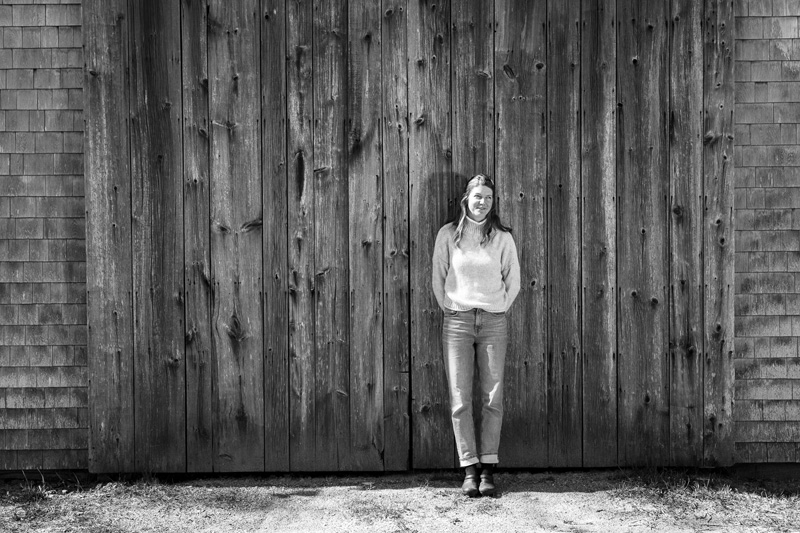
Tell us about a highlight.
One year stands out as a highlight. Our old tractor (a gift from a neighbor and CSA member) broke down early in the season. So we restructured our fields and our growing practices to farm without a tractor, relying on a small, walk-behind tractor and our hand tools. In the fall, we launched a Kickstarter campaign to help us purchase a new tractor for Slip Away. We met our fundraising goal within a matter of days, and we were able to purchase the best little John Deere, which remains a reliable tool that fits our scale. It was a reminder of how well supported we are, and always have been, by our community. I really felt the love that year.
What’s the biggest/hardest lesson you’ve learned?
Soil is everything. Without healthy soils, you cannot have healthy crops. Out here on Chappy, we are farming on sand; it is literally like farming on the beach. Little organic matter and low in nutrients. Our main growing field is not easily accessible for delivering compost, so over the years I have experimented a lot with growing different types of cover crops to help build our land. Last year, we were able to move the fields entirely into no-till production (tillage is extremely bad for soil health), and we immediately noticed a difference in our crop yield and quality. We are still fine-tuning our no-till methods, but I feel that we will only see our soil continue to improve from here.
What makes farming here different?
Farming here is different from farming elsewhere because of the large influx of customers in the summer. In other places, farmers have eight-plus months of the year to make a living. Our customers are really only here for two months: July and August. So as Island farmers, we basically have those weeks to make our living for the year.
Luckily, many of our summer visitors and residents are interested in buying food from the Island. Hopefully the trend for local produce and flowers continues into the future. Other than that, I would say there are not too many farms in the world that take a three-minute ferry to get to Farmer’s Market every Saturday morning!
Farm stand, CSA, West Tisbury Farmers Market
508-627-7465 slipawayfarm.com, @slipawayfarm
Mallory Watts, Milkweeds Farm, Chilmark
What type of farmer are you?
I am primarily a vegetable farmer, but I was fortunate enough to have some fruit trees and blueberry bushes planted on the property before I started.
How long have you been farming on this farm?
I have been affiliated with this property since 2017, but I officially started farming here in March of 2018.
Did you grow up on a farm? Go to school for it?
I did not grow up on a farm, but I grew up being outside all day. There was a horse farm down the street from my parents’ house, and I loved to go there to feed the horses. My grandpa owned a farm, and it was always a treat to go there. My brothers and I would catch frogs by the pond and chase the birds in the barn. My grandpa didn’t grow anything or raise any animals, but he enjoyed taking care of the land. In 2016, I completed an urban agriculture certification course at the Youth Farm in Brooklyn, N.Y. That’s when I took more of an academic approach to farming, and understanding the food system and food insecurity.
What’s the biggest/hardest lesson you’ve learned?
The biggest lesson I’ve learned is to work smarter, not harder. It’s a bit of a cliché, but so much time is wasted when you do a task without thinking it through to completion. Though every season changes and new challenges emerge, I try to abide by the systems I put in place, and then at the end of the season, I reflect and evaluate on how things could improve for the next year.
Quenames Road, Chilmark
West Tisbury Farmers Market
milkweedfarm-chilmark.com, @milkweedfarm_mv
Lydia Fischer, The Garden Farm, West Tisbury
What kind of farmer are you?
I am primarily a vegetable farmer, though I do grow some flowers. Notably I replant my Poppy’s dahlia tubers every year.
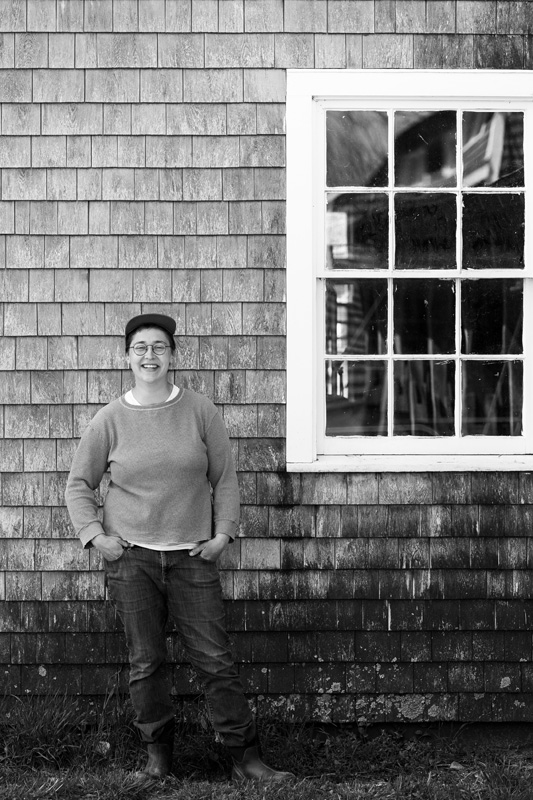
Did you grow up on a farm, or go to school for it?
I did not go to school for farming, but it was always in the periphery of my childhood. You could say that I became a farmer by chance, but as more time goes on, I really do feel like I was destined to be a farmer. My grandparents lived on and owned Beetlebung Farm with my aunt, Marie Scott, running it all through my childhood. Later my brother managed the farm for many years.
What is the biggest/ hardest lesson you’ve learned?
My favorite thing about farming is that I grow along with my crops. I love that I am forced to learn something new all time, whether I’m planting a new crop or trying a new technique. The possibilities for how you approach farming are endless, and there’s new ideas popping up all the time. I’ve worked a lot of monotonous jobs in my life, and while there are things that I do similarly from season to season, no season is the same. Which leads me to the point of the best lesson I have learned from farming: Farming has taught me, and continues to teach me, to let go and trust the process. Plants just want to grow, AND you can’t change the weather. There will forever be challenges, but with perseverance they are usually overcome-able.
What is the best thing you make in your own kitchen from something you produce on your farm?
Broccoli raab sautéed with garlic, salt, and pepper — that’s the best. A fresh orange tomato, still warm from the sun, with a sprinkle of salt and sliced mozzarella on a baguette: heaven.
West Tisbury Farmers Market
@thegardenfarmmv
Clarissa Allen, Allen Farm, Chilmark
What type of farmer are you?
I am primarily a sheep farmer.
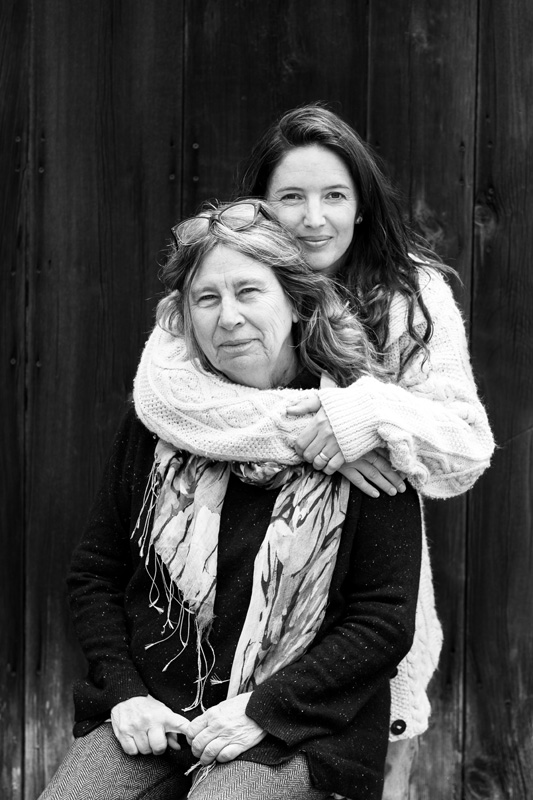
Did you grow up on a farm? Go to school for it?
When I was a child we had cows and sheep. After my father died when I was 15, there were no more animals. When I returned home from college in 1975, I soon had goats, donkeys, and horses. This farm has been in our family for hundreds of years; it is a part of my heritage and my identity.
Tell us about a highlight.
The highlight of my farming experience has been keeping this farm, and being able to pass it along to our son and his wife Kaila.
What would you consider to be the biggest issue you, and other Island farmers, will face in the coming years?
The biggest issues we face in Island agriculture is the keeping of our cultural rootedness, identity, and simplicity.
What is the best thing you make in your own kitchen from something you produced on your farm?
Probably the best things from my kitchen are braised lamb shanks; our garlic, jalapeño lamb sausages; and simple grilled boneless leg of lamb.
421 South Road, Chilmark
508-645-9064, allenfarm.com, @allenfarmsheepandwool
Kaila Binney Allen-Posin, Allen Farm, Chilmark
Did you grow up on a farm? Or go to school for it?
I did not grow up on a farm, but have been lucky enough to marry a wonderful man who happens to be a wonderful farmer. I have been welcomed into a farming family full of profound teachers, who are also open to my (sometimes wild) ideas, and personal process in my own farming practices. My background is primarily rooted in teaching small-scale sustainability methods, first as a permaculture teacher overseas, and then as a school garden educator here on the Island. Over the past 12 years, I have gradually taken on the role as our gardener, with supporting roles in all other things.
I think perhaps the most beautiful thing I have learned on this farm is the power of humility, particularly on a farm that has such history, and presence, in the public. It is a landmark on the Island, and the decisions we make — from where we stack our silage bales to installing a wind turbine — spark a dialogue with passersby. And amid that pressure to hold up the legacy of this farm not only for the family but for the Island, I have never been discouraged from trying something new, or doing something differently. I am still, truly, in awe of Clarissa’s humility, and her ability to empower me and so many others on and off the Island, by giving such a safe and supportive space to learn by just jumping in and doing it in whatever way I feel. After her fight to keep this farm (which could, and should, be a whole other story to publish), and to continue as the oldest working farm on the Island, I would have expected a much more rigid, and perhaps dictated, guide on what to do and how to do it. Instead what I have found is a thoughtfully constructed foundation onto which anything can be built.
I’m not sure I would have been able to be as humble, as open, or as generous as the matriarch of this farm, but I am now taking on that legacy too. And I am utterly grateful.
During this current crisis, what has stood out to me is the need for farms to go beyond what they may represent, and simply provide greater access to the things we all need to survive. Farming here can be viewed as another element of the aesthetic of this beautiful Island, and there may not be anything more beautiful in my mind, but it is much more than that. We simply need to grow more food for everyone, especially those who may not even know our farms exist. Again, a lesson in humility which I will be forever learning.
421 South Road, Chilmark
508-645-9064, farm stand, allenfarm.com, @allenfarmsheepandwool
Barbara Ronchetti, Island Alpaca, Vineyard Haven
What type of farmer are you? Vegetable, animal, mixed?
We are an alpaca farm, with a herd size of 37 alpaca. Included are two baby alpaca (also known as cria), born in 2019.
How long have you been farming on this farm?
Land was purchased in 2004, and the barn constructed and fencing installed and finished late summer 2005; first alpaca arrived in November 2005.
Tell us about a highlight.
The most rewarding is a visit to Camp Jabberwocky. One day we made a surprise visit there to learn that most of the campers were away on a pirate ship, and it was only a small number of campers who had to stay behind. They were so thrilled that they too could have their own, special event with the visit of alpaca.
What would you consider the biggest issue you, and other Island farmers, will face in the coming years?
Most concerned about the dramatic weather changes we are seeing. We have had a number of hot and dry summers recently that were very hard on our pastures. I suspect that drought, for those who do not have irrigation, would be a big challenge for the local farmers, and for that matter all farmers across the country and around the world.
1 Head of the Pond Road, Vineyard Haven
508-423-1443, islandalpaca.com, @islandalpaca
Caitlin Jones, Mermaid Farm, Chilmark
What type of farmer are you?
Right now I am a shepherdess; I take care of all the sheep in the winter, they are mine until the spring. I take care of the hay and all the birthing, fencing, and cuddle the babies. In the spring when the baby lambs and moms are ready, I turn them over to my husband, Allen Healy, and he begins to take them around various fields to graze. I still grow vegetables as well, keeping the greenhouse going. I am investigating new crops, working with herbs for cooking and healing, as an undercrop and pollinator. I am also interested in acorns, which you can turn into acorn flour.
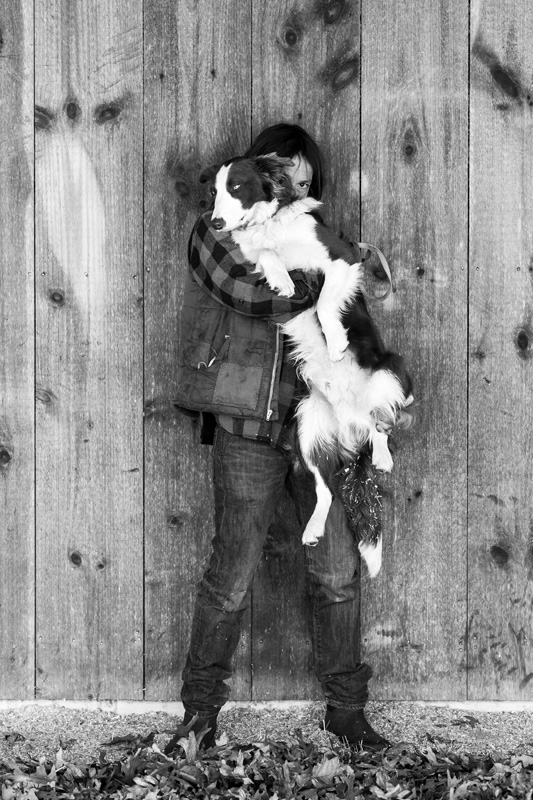
If you could change one thing about farming on the Island, what would it be?
I am not changing anyone’s thing! I am changing myself.
Have you had any disasters?
Not getting my deer fencing secured. I started to wonder where all my green tomatoes were going, and I headed to my garden and saw the fencing had failed in a spot. But on a farm there are so many disasters, and I really feel like mistakes are your best teachers. I try to tell my boys this, that mistakes create confidence.
What’s the best thing you make in your kitchen from your farm?
I like nettles. I am not sure if I am even doing this right, I am not a great cook, but I throw nettles in a pan with some water, try not to burn them; I steam them, getting the sting out. I put the cooked nettles on a plate with butter, sprinkled seaweed, and some of our cheese on top. If I want protein, I add a few eggs.
9 Middle Road, Chilmark
Farm stand and West Tisbury Farmers Market
mermaidfarm.org, @mermaidfarmmv
Krishana Collins, Tea Lane Farm, Chilmark
What type of farmer are you?
Flowers and vegetables.
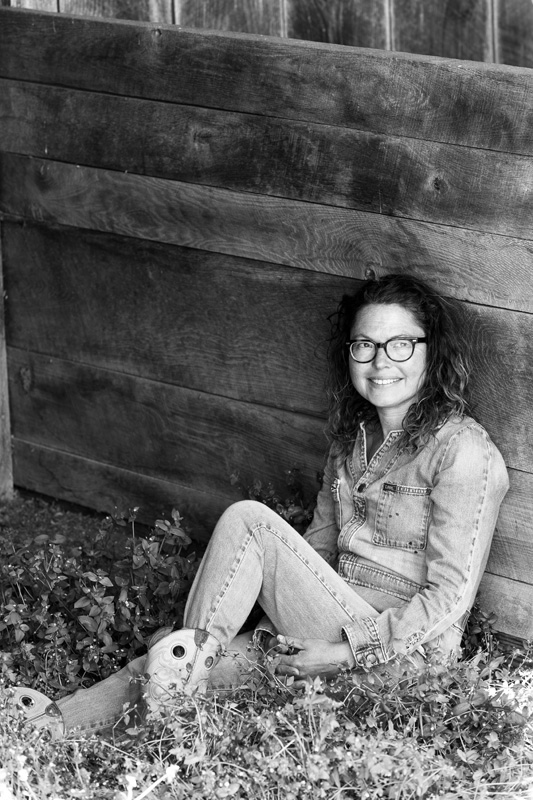
How long have you been farming on this farm?
Eight years on Tea Lane. Farming for 26 years.
Tell us about a highlight.
The best day of my farming career was the day I was awarded Tea Lane Farm. Not only did my dream of farming for the rest of my life come true, I could also set up the farm with the proper infrastructure to be more efficient and successful.
What’s the biggest/hardest lesson you’ve learned?
Nature is far more powerful than any of us.
What would you consider the biggest issue you, and other Island farmers, will face in the coming years?
Land security. Long-term access to good farmland. An issue I faced before being awarded Tea Lane, and an issue so many farmers face, both young and old.
Middle Road, Chilmark
West Tisbury Farmers Market
774-563-8274, tealanefarm.com, @tealanefarm


Great article. What would be helpful for readers and the farms is to link us to their products page, if available, so we can support them by direct purchasing.
If you sign up for the agricultural society mailing list, you will get a weekly list of who has what available and how to get it! Sign up though the mvas website
Comments are closed.